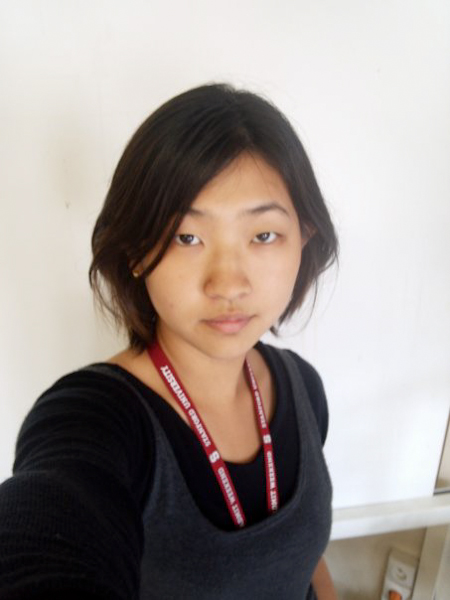Nayoung Woo ’12 documents LGBTQ issues
“In America, I won’t be doing this in my head, I’ll be doing it on a calculator. Since you are not providing me with a calculator, I will skip this question.”

This tongue-in-cheek remark was Nayoung Woo’s recollection of her response to a question on polynomial calculus during an interview. The interview was for a scholarship from her government in South Korea to study science at Stanford, which fewer than 10 students that year — including Woo — received. The competition was made more difficult by the fact that Woo was on a literature, not science, track in high school.
Although Nayoung Woo ’12 will be graduating this spring with a bachelor’s degree in chemistry, her involvement in many activities at Stanford reflects the diversity of her academic interests. She was a student representative on the Study of Undergraduate Education at Stanford (SUES) committee, which included two student representatives and a dozen professors. The SUES committee released a report in January that examined and gave recommendations about many aspects of undergraduate life, from general education requirements (GERs) to overseas studies. This report led to several changes, including the replacement of the Introduction to the Humanities (IHUM) program. Woo, who served as a student ambassador during the review process, helped the committee ensure the recommendations would not negatively impact students and hold meetings to report directly to students.
“Once we got our gears rolling [we] met with students every week,” Woo said. “We mostly stormed dining halls but also met with point groups to talk to everyone.”
While Woo values academics, her strongest passions lie in her work with the Asian LGBTQ community. This passion started before she came to Stanford, when she did research on HIV/AIDS in South Korea, focusing on two of the most at-risk communities — sex workers and homosexuals.
Woo wanted to continue her work when she came to Stanford and became actively involved in the Asian LGBTQ community, eventually identifying problems in the community she believed many were ignoring. Woo struggled to decide how to start the conversations.
“I didn’t want to just write about it,” Woo said. “I didn’t think that any demographic study or any fictional writing that I could have done would have given justice to that community, so I learned filmmaking.”
Armed with the medium of film, Woo made “Should Be, Could Be, But Is,” a documentary following a gay Korean student and his experiences upon his arrival at Stanford.
According to Woo, her documentary evokes a strong reaction in the audience due the raw footage and emotional testimonials.
“For an average straight person I think that they will feel shock,” Woo said. “They think that there is only one queer community, one way to be gay.”
This message — that being gay does not mean one thing — has resonated with the broader LGBTQ community at Stanford. Since Woo made the documentary, Intersections — an weeklong event focused on the intersections of race and sexuality — has taken place annually on campus. Woo agreed with her documentary subjects to restrict the film’s availability because of the sensitivity of LGTBQ issues in their communities and in South Korea. Despite strict privacy agreements that only allow the documentary to be shown when Woo is present, “Should Be, Could Be, But Is” has already been screened for many campus groups. This summer, Woo will present her documentary at the National Queer Asian Pacific Islander Association conference in Washington, D.C.
Woo fulfilled the class requirements for the Ethics in Society honors program, but decided to spend her last few months at Stanford working on another documentary on the Asian Queer community instead of completing a thesis. When she graduates this spring, she will be a Fellow of the Coro Program in Public Affairs — a full-time, nine-month, graduate-level training program in New York City which prepares fellows aspiring to work in public affairs.
The road to Woo’s accomplishments was opened with that fateful scholarship interview. While Woo’s spunky response must have resonated well with the interviewers — after all, she did receive the scholarship — Woo was not so sure at the time.
“It is probably the worst interview that I’ve ever had,” she said.